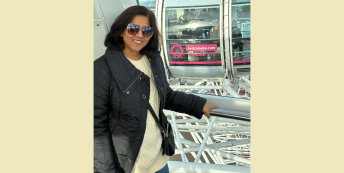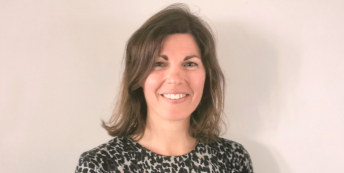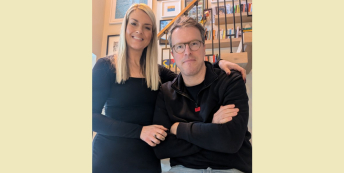“I couldn't believe that I'd let myself end up doing something that I found so unstimulating.”
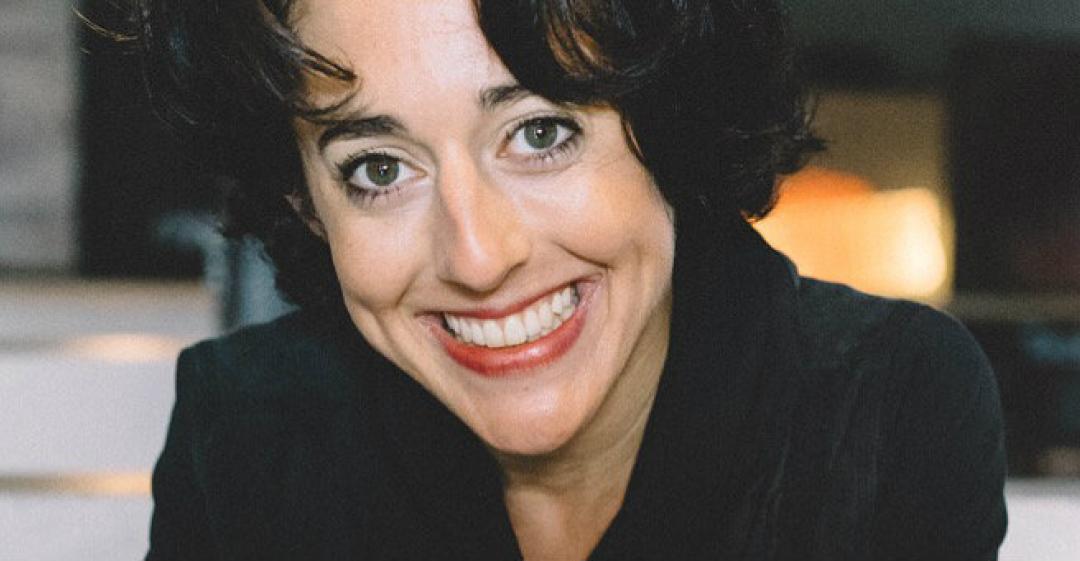
What work were you doing previously?
I was a corporate and commercial lawyer, working in London.
What are you doing now?
I have set up my own business, The Hot Breakfast, which brings together small groups of people who share values but have different perspectives.
The events are all bespoke, and take place over breakfast in cafes across London on weekday mornings.
The aim is to stimulate new thinking, break down the silos between disciplines and encourage action, so that people make the most of their skills and ideas.
How did you feel about your work before you decided to make a change?
I had lost all self-respect.
This says nothing about the law: I know plenty of people who get a real kick out of legal work and for whom it is a fantastic career. Unfortunately I was not one of them.
I couldn't believe that I'd let myself end up doing something that I found so unstimulating. I'm a natural enthusiast – and an enthusiast without enthusiasm for the work that takes up 85% of her day is not a happy person.
But I was also tortured by all the possibility that there was out there: so many potential avenues, but none of them seemed viable, for one reason or another. It made me feel hopeless.
Why did you change?
My father died.
I loved him very much. It was the kind of seismic event that forces you to realise how precious time is and how precarious are all the things that you take for granted. I was desperate, and desperation is ripe territory for radical action.
When was the moment you decided to make the change?
There was a slightly uncanny combination of events in the summer, about five years ago, that I decided to interpret as a nudge to act.
One greyish afternoon, I went for a coffee with an impact investor with whom I'd been put in touch, who told me about an excellent MSc in Environmental Technology at Imperial College. The investor said that the MSc was open to people from an arts background (notwithstanding the name of the course and the University's reputation) and was seen as a good gateway to careers in sustainability.
I rang the course leaders that afternoon, and heard that if I acted quickly I could potentially join the September cohort. At 5 a.m. the following morning I set off for the airport for a long scheduled holiday with a good friend – a friend who turned out to be the only person I knew who had done that particular course at Imperial. I grilled her intensively on what it was like and she sung its praises. And when we touched down in Lisbon, I received an email telling me that I had inherited £9,000 from my grandparents, which was precisely the amount I needed to cover the course fees.
That afternoon, less than 24 hours after hearing about the MSc and fired up by Portuguese sunshine and sangría, I rang my supervisor to hand in my notice and submitted my application to Imperial. Thankfully, they let me in, otherwise this would have been a nice lesson in hubris.
Are you happy with the change?
To put it mildly!
Which is not to say that it wasn't excruciating at times; nor to imply that I now consider myself to have resolved all those big questions of career identity (aka identity) forevermore. But I am infinitely happier now.
What do you miss and what don't you miss?
I really miss the teamwork.
The camaraderie that comes from working intensely with a group of people you respect is very uplifting, just as setting up your own stall can make you feel horribly isolated and exposed.
As a lawyer you get to work with bright, curious and driven people – and bright, curious and driven people are interesting to be around. However, it turns out there are those people in every sector and it's now my job to hunt them down, so while I miss the individuals, I don't miss the species, so to speak.
And of course, you expect me to say that I miss the salary. Well, I do, I suppose. But I don't miss realising that I'd spent a gross quantity of cash on sassy office-wear and activated tripe from Wholefoods in a bid to make myself feel better, only to discover – drumroll – that the opiate made no difference, and that I just felt sickened by the consumption.
How did you go about making the shift? And how specifically did you choose your new career?
After finishing the MSc I worked for an environmental NGO.
Although on many levels the work was fascinating, I realised that I was definitely better suited to working in the private sector. It did, however, give me the time to set up a side project that was The Hot Breakfast. I never intended The Hot Breakfast to be a business; it was simply a labour of love. But it grew, and as it grew I honed the format and the formula.
It took a couple of years – during which I worked full time for start-ups in the sustainability sector as a project developer and then an in-house lawyer – before I realised that The Hot Breakfast seemed vocational, and that I would never be satisfied unless I tried to make it stand fully on its own feet as a business.
How did you handle your finances to make your change possible?
I am bootstrapping The Hot Breakfast: I've seen too many start-ups fail after getting giddy with cash to hunt down investment at this early stage.
So, at the moment, while the income is pretty meagre, I am mainly running off the savings I put away as a lawyer. A lodger helps me to pay my mortgage, and inevitably I've ditched the office-wear and tripe.
I've always felt reassured that, in a mouldy reality where my dreams and graft come to nought, I can supplement my income by finding legal work. That is becoming increasingly unlikely now, as I am developing different skill sets that I would much more readily use, but the thought does still reassure me during the dark hours of 3–5 a.m.
What was the most difficult thing about changing?
Based on both my own experience and on what I hear from people who come to The Hot Breakfast, I think that the City has a certain aptitude in crushing self-esteem.
I think this is because you are obliged to become highly specialised in your chosen discipline: your confidence in your ability to advise on anything other than, say, the Insolvency Act 1986 evaporates. That leads to paralysis, because you're miserable in what you're doing but can't conceive of an alternative existence where you might be useful.
The first change is therefore undoubtedly the hardest, especially when you appear to be rejecting a secure and well-regarded career. To many people such rejection seems irrational. Your reputation may well be built on people's confidence in your rationality, so that just compounds the horror of the situation.
What help did you get? 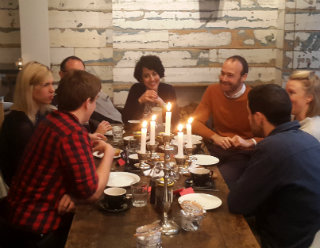
There are very many people I could thank for the time that they took with me, as listeners and advisors.
None were formal careers coaches or equivalents, though I have subsequently met many such people through The Hot Breakfast, and I can see that they potentially have plenty to add.
I think I should mention that I practised a lot of yoga. I've noticed a significant correlation between people increasing their yoga practice and making positive changes to their lifestyle and work (correlation or causation, depending on your perspective). No doubt other forms of meditative exercise, or combinations of meditation and exercise, are just as beneficial, at least for some people.
What resources would you recommend to others?
Your friends, and their friends, and all those people who might be friends.
They're all invaluable (though only in person, not on social media; on social media they can be as noxious as the stereotypical secondary school careers teacher).
There is obviously a mass of 'self-help' literature out there. A lot of it can be pretty trite, but naturally what resonates often depends on the circumstances in which you get to it.
What have you learnt in the process?
At the risk of sounding really geeky, I think that it can be useful to frame careers in terms of 'negative' and 'positive' liberty (as Isaiah Berlin would put it), or in terms of what they offer 'freedom from' and 'freedom to' do. Different careers offer different balances of each liberty, and our personal requirements for each kind of freedom evolve over time.
My experience of the law was that it was great for negative liberty (freedom from financial insecurity, for example) but not so hot on autonomy or creativity, and there reached a juncture in my life where that became really stifling. Founding my own business gives me free rein to spend my energy as I please, and be as creative as I see fit.
Right now that's what I want, though I may decide that I need more stability in the future.
What do you wish you'd done differently?
Edith Piaf has a good line about regret.
What would you advise others to do in the same situation?
"The more people I meet, the more luck I have."
This is one of the founding premises of The Hot Breakfast. I would recommend that you hunt down as many people doing as many relevant things as you possibly can, and interrogate them (charmingly) about what they do and why they do it. Ideally people of all different ages, because each age has a different kind of wisdom and insight. Then you need to work out who to listen to and who to ignore.
I would also say that your brains are too good to waste doing something half-heartedly. You'll only excel at things that you love. So, if you don't want to be average, you have to pursue the things that really engage you. I have yet to meet anyone for whom that has not worked out.
To find out more about Kate's venture, visit www.thehotbreakfast.com.
What lessons could you take from Kate's story to use in your own career change? Let us know in the comments below.

